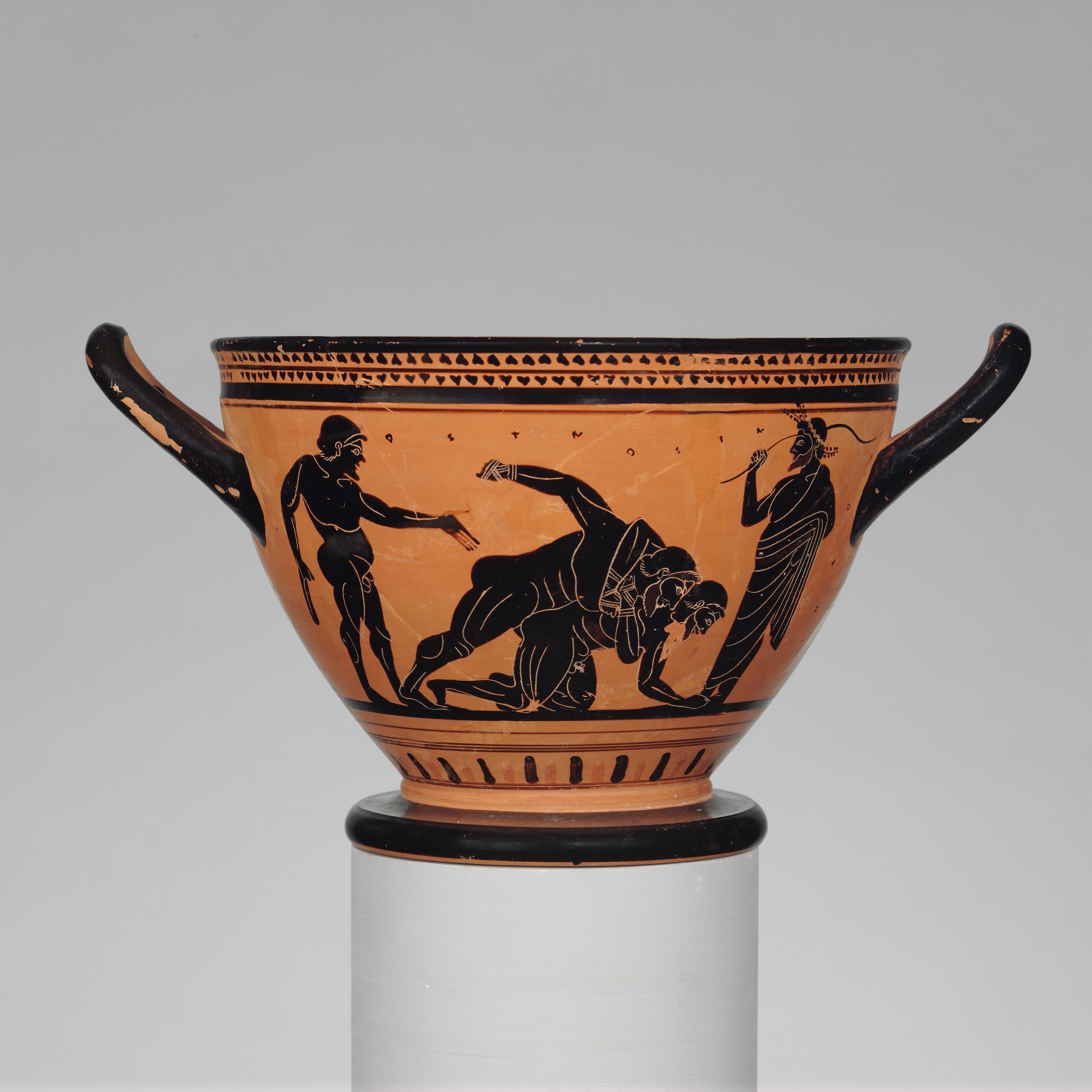The Olympics are a truly momentous occasion showcasing athletes who have put in a lifetime of work to get to the global stage. Since the first modern Olympics in Athens, Greece in 1896, there have been 29 Summer Olympic Games in 21 cities and 24 Winter Olympic Games in 21 cities. Many of us watch the events cheering on our teams and countries but how many of us know the history behind this quadrennial event?
Ancient History
Origins in Olympia
The ancient version of the Olympics was held in Olympia, Greece from 776 BCE through 393 CE. The games draw their name from Olympia, an ancient religious site considered sacred to the Greek gods. Olympia was once home to one of the Seven Wonders of the Ancient World: a colossal statue of Zeus. Due to its historical and religious significance, Olympia remains a UNESCO World Heritage Site. The earliest structural remains at Olympia date from 2000 BCE to 1600 BCE, and the sanctuary itself dates from 1000 BCE.
Terracotta skyphos (deep drinking cup) depicting the Pankration event circa 500 BCE. Image courtesy of: The Metropolitan Museum of Art, New York.
Events and Traditions
Like the modern games, the ancient Olympics were held every four years as part of a festival honoring Zeus. Originally, the games consisted of only one event, a foot race. The first recorded winner of this race is Koroibos, a cook from nearby Elis. From 776 BCE to 724 BCE, this foot race was the only event held at the ancient Olympics. By the 5th century, the roots of the modern games began to take hold. These games lasted a full five days and included many sports. Only men were able to compete in the event’s many sports, including boxing, pankration (similar to mixed martial arts), running, jumping, throwing, and even chariot racing. All contestants were required to compete in the nude. For the ancient Greeks, this was a tribute to Zeus and a way to show off their physique and form to the King of the Gods.
Terracotta Panathenaic prize amphora (jar) awarded to the victor of the chariot race circa 520 BCE. Image courtesy of: The Metropolitan Museum of Art, New York.
The Decline of the Ancient Games
Because of the religious significance, major international events and wars were planned around the games. The games were a time of peace, and physical conflicts in the Greek world stopped at the sanctuary. Athletes for the games were granted safe passage through warring city-states. While fighting would cease, national rivalries persisted. The games often became a replacement for armed conflicts between feuding city-states. To be the Olympic champion was to be the victor. The games in Olympia may have been the first, but by the end of the 6th century, the Greek world had four such events that held similar, if not equal importance: the Olympic Games held at Olympia, the Pythian Games at Delphi, the Nemean Games at Nemea, and the Isthmian Games near Corinth. As many as 150 smaller events were also held across the Greek world. As it lost its independence to Rome, the games gradually decreased in importance and came to an end. While Greeks saw being an athlete as noble and honorable, Romans viewed it with contempt, considering it degrading to strip down and compete in public. Many Roman Emperors understood the political importance of continuing to hold the games, though Romans did not train for or enter the Greek sports. Gladiatorial contests and Roman chariot races were fully separate from the Olympic Games. Eventually, Emperor Theodosius I abolished the games in 393 CE, and his son Theodosius II had the temples destroyed in 426 CE. Despite this, the world retained a fascination with the games that took them to the global stage in 1896.
Modern Games
Panathenaic Stadium 1896 opening, Public-domain image courtesy Wikimedia Commons
The Inaugural Modern Olympics
The inaugural modern Olympics were held in Athens, Greece in 1896. 280 male athletes from 12 countries competed in 42 events. The track and field events were held in the Panathenaic Stadium, first built in 330 BCE and restored for the Olympics. The 1896 Olympics featured the first marathon, a race based on the Greek legend of Pheidippides, a trained runner who ran from the plain of Marathon to Athens to announce the defeat of the Persians.
Inclusion of Women in the Olympics
Women first competed in the 1900 games held in Paris, France. 22 women competed in five sports: tennis, sailing, croquet, equestrianism, and golf. 11 women competed in the 1924 Winter Olympics in the figure skating event, which was the only winter event open to women until the inclusion of the Alpine in 1936. Today, women make up nearly 50% of Olympic athletes and as of the 2012 games in London, women compete in every sport in the program.
Evolution and Expansion
The Summer Olympics have been held every four years without fail, except for 2020 when the COVID-19 pandemic caused a postponement to 2021. The Winter Olympics, first held in 1924 in the French Alps, continue in the same fashion. The Paris 2024 games are scheduled from Friday, July 26, 2024, to Sunday, August 11, 2024.
Learn About Our Ancient Greece Exhibit Read More on the Blog
Sources:
- www.penn.museum/sites/olympics/olympicorigins.shtml#:~:text=Although%20the%20ancient%20Games%20were,presented%20the%20idea%20in%201894.
- www.britannica.com/sports/ancient-Olympic-Games
- https://www.britannica.com/sports/Olympic-Games/History-of-the-Olympic-Winter-Games
- https://www.britannica.com/sports/Olympic-Games/History-of-the-modern-Summer-Games
- https://www.britannica.com/place/Olympia-ancient-site-Greece
- https://olympics.com/ioc/faq/history-and-origin-of-the-games/when-did-women-first-compete-in-the-olympic-games




